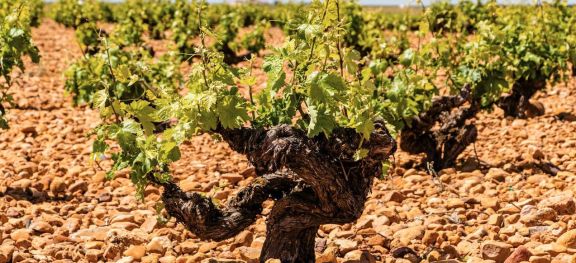Our 2021 writing competition

31 March 2021 Note that the dates of the South African trip offered to the winner have been changed to 'by mutual arrangement' as coinciding with Cape Wine would be likely to rob the winner of the full attention of growers and winemakers.
30 March 2021 Pictured is one of the old vines in La Mancha responsible for the exciting Verum wines made by Elías Lopéz Montero, who contributed greatly to last week's Old Vine Conference.
We're always surprised by the popularity of our annual writing competition and sincerely hope this year will be no exception. Inspired by the Old Vine Conference, an initiative designed to emphasise the value of old vines and to try to keep them in the ground rather than being pulled out in favour of higher-yielding young vines, we are proposing to make old vines the topic of this year's competition.
We're announcing this year's competition rather earlier than usual because we think contestants may need quite a lot of time to research their entries. What we're looking for is:
An account of an old vineyard, or parcel of old vines – the less well-known the better
It should ideally be a good read rather than an academic treatise, and we encourage you to put the vineyard in a social context as well as a viticultural one. We'd love to know why the vines were kept in the ground so long and the reasons you think they have managed to survive. Any human colour and details of the history of the vineyard would be welcome, as well of course as information on what is planted and what happens and has happened to the grapes.
Rules of the competition
- Your account can be anything between 500 and 2,000 words long and should not have been published previously.
- It should be accompanied by at least one copyright-free image in JPG, JPEG, GIF or PNG format that we may publish 1,275 pixels across and 725 pixels high. But feel free to send more than one image, or even a video.
- Your entry should be sent in a Word document attached to an email, along with your image(s). No other formats will be accepted.
- Send your entry to editorial@jancisrobinson.com entitled WWC 2021 followed by your full name in the Subject line.
- Include a brief description of yourself in the email.
- The deadline for entries is 30 June 2021.
- It can be about your own vineyard, or a vineyard in which you have a commercial interest, but you must declare this up front.
- The vines must have been planted before 1980.
We will not accept entries after 30 June 2021 and we intend to publish the best entries in July and August, announcing the winner(s) in early September.
The Old Vine Conference initiative is designed to increase the perceived value of old vines in the eyes of growers, wine professionals and wine lovers. Under the direction of Sarah Abbott MW a first-class conference on the topic was held last week attended by hundreds of people all over the world who are clearly interested in old vines. You will find links to recordings of the proceedings on oldvines.org.
They are actively recruiting engagement from individuals so do visit the Old Vines website and think about becoming a member. They are also presenting the most wonderful prize for our competition. They will fly the winner out to South Africa in October 2022, pandemic permitting. The winner will be taken on a three-day tour of certified heritage vineyards meeting growers and winemakers, and tasting wine, dates to be mutually agreed. Economy flights, travel, accommodation and meals in South Africa are included. Sarah Abbott MW adds, 'we realise that’s quite a lot of looking forward to be done, so we will in the meantime (at an agreed date this year) host a virtual tasting featuring some great old-vine wine for the winner too'.
(Wine writer Tim James of Cape Town points out that there should be a decent alternative for a winner who happens to be based in South Africa anyway, and Sarah Abbott MW promises to rise to the challenge should that happen.)
Other prizes will include magnums of their Geyserville old-vine field blend from Ridge Vineyards of California, who have been supporters and curators of some of their state's rich array of old vines for decades, and some rather special secateurs, an important tool in prolonging the life of a vine – or your roses perhaps?
This year there will also be a people's vote for the best entry. So we would encourage you to read as many of them as possible once we start publishing them in July.
We look forward very much to receiving this year's entries and hope that this year's competition will be as illuminating and entertaining as those in 2020, 2019, 2018, 2017 and all the way back to our first writing competition in 2014.
Become a member to view this article and thousands more!
- 15,408 featured articles
- 275,024 wine reviews
- Maps from The World Atlas of Wine, 8th edition (RRP £50)
- The Oxford Companion to Wine, 5th edition (RRP £50)
- Members’ forum
- 15,408 featured articles
- 275,024 wine reviews
- Maps from The World Atlas of Wine, 8th edition (RRP £50)
- The Oxford Companion to Wine, 5th edition (RRP £50)
- Members’ forum
- 48-hour preview of all scheduled articles
- Commercial use of our wine reviews
